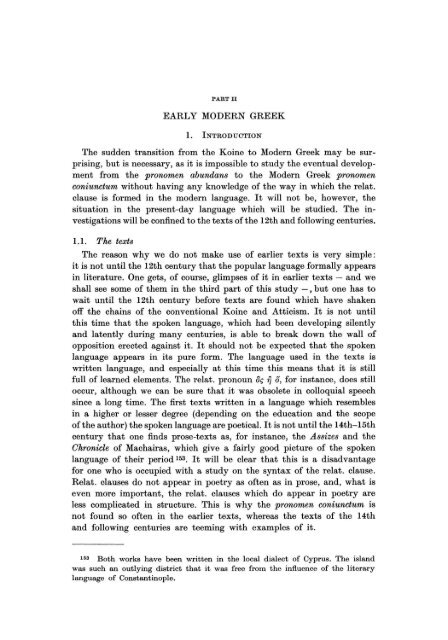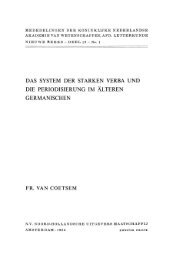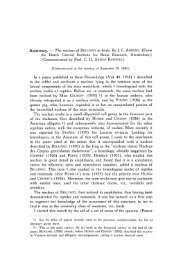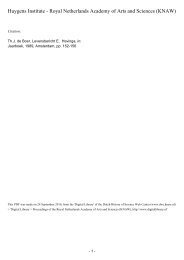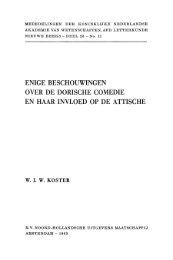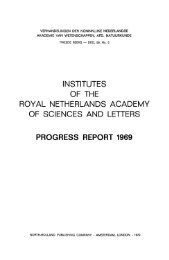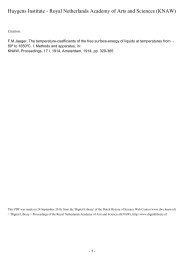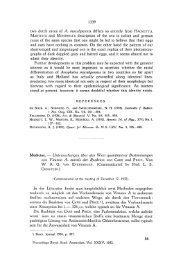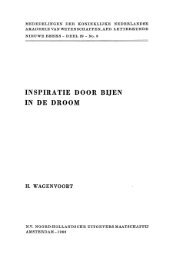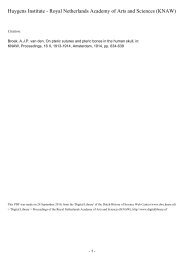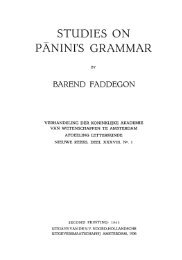Pronomen Abundans and Pronomen Coniunctum. A ... - DWC
Pronomen Abundans and Pronomen Coniunctum. A ... - DWC
Pronomen Abundans and Pronomen Coniunctum. A ... - DWC
You also want an ePaper? Increase the reach of your titles
YUMPU automatically turns print PDFs into web optimized ePapers that Google loves.
PART II<br />
EARLY MODERN GREEK<br />
1. INTRODUCTION<br />
The sudden transit ion from the Koine to Modern Greek may be surprising,<br />
but is necessary, as it is impossible to study the eventual development<br />
from the pronomen abundans to the Modern Greek pronomen<br />
coniunctum without having any knowledge of the way in which the relat.<br />
clause is formed in the modern language. It will not be, however, the<br />
situation in the present-day language which will be studied. The investigations<br />
will be confined to the texts ofthe 12th <strong>and</strong> following centuries.<br />
1.1. The texts<br />
The reason why we do not make use of earl ier texts is very simpIe:<br />
it is not until the 12th century that the popular language formally appears<br />
in literature. One gets, of course, glimpses of it in earlier texts - <strong>and</strong> we<br />
shall see some of them in the third part of this study -, but one has to<br />
wait until the 12th century before texts are found which have shaken<br />
off the chains of the conventional Koine <strong>and</strong> Atticism. It is not until<br />
this time th at the spoken language, which had been developing silently<br />
<strong>and</strong> latently during many centuries, is able to break down the wall of<br />
opposition erected against it. It should not be expected that the spoken<br />
language appears in its pure form. The language used in the texts is<br />
written language, <strong>and</strong> especially at this time this means that it is still<br />
full of learned elements. The relat. pronoun 8ç ij ö, for instance, does still<br />
occur, although we can be sure that it was obsolete in colloquial speech<br />
sin ce a long time. The first texts written in a language which resem bles<br />
in a higher or lesser degree (depending on the education <strong>and</strong> the scope<br />
ofthe author) the spoken language are poetical. It is not until the 14th-15th<br />
century that one finds prose-texts as, for instance, the Assizes <strong>and</strong> the<br />
Chronicle of Machairas, which give a fairly good picture of the spoken<br />
language of their period 153. It will be clear that this is a disadvantage<br />
for one who is occupied with a study on the syntax of the relat. clause.<br />
Relat. clauses do not appear in poetry as of ten as in prose, <strong>and</strong>, what is<br />
even more important, the relat. clauses which do appear in poetry are<br />
less complicated in structure. This is why the pronomen coniunctum is<br />
not found so of ten in the earlier texts, whereas the texts of the 14th<br />
<strong>and</strong> following centuries are teeming with ex am pIes of it.<br />
153 Both works have been written in the local dialect of Cyprus. The isl<strong>and</strong><br />
was such an outlying district that it was free from the influence of the literary<br />
language of Constantinople.


